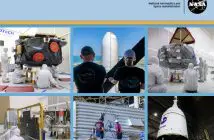
NASA Administrator Bill Nelson and Deputy Administrator Pam Melroy have stepped down from their posts following the inauguration of Donald Trump in Washington this week. The changing of the guard at NASA is one of many changes the space sector can expect as Trump begins his second term as president.
“I leave public office today after 53 years, thank you for the great privilege of a lifetime of serving the people of our country,” Nelson posted on X on January 20, 2025.
“What an honour it has been to work alongside the people of NASA,” posted Melroy. “Onward and upward!”
Both the well-regarded officials were political appointees who took up their roles following Joe Biden’s election. Trump has nominated Jared Isaacman for the administrator’s role. In the meantime, Kennedy Space Center Director Janet Petro is serving as the acting administrator. It is uncertain how long the Republican-controlled US Senate will take to confirm Isaacman’s appointment.
Trump promises a shake-up of the space sector
Trump’s return to the White House promises to shake up the space sector beyond a changing of the guard at NASA. He planted space on the agenda during his inauguration speech when he vowed to send American astronauts to Mars.
“We will pursue our manifest destiny into the stars, launching American astronauts to plant the Stars and Stripes on the planet Mars,” he said.
SpaceX founder and Trump shadow Elon Musk firmly supports crewed missions to Mars. His constant presence by the president’s side is causing some consternation about his influence on Trump’s space agenda and SpaceX’s role in it. Jeff Bezos, founder of space company Blue Origin, was also in Washington and at the inauguration this week.
Musk, among others, is advocating for the axing of the National Space Council, a cabinet policy panel that garnered only mixed reviews for its influence during the Biden administration. Musk reportedly views the council as a “waste of time.”
Trump a supporter of US astronauts heading to Moon and Mars
Trump firmly supports NASA’s agenda to return US astronauts to the Moon and Mars, seeing them as ripe for human exploration. However, he is less tolerant of NASA’s risk-averse culture and lingering cost-plus legacy contracts such as the Boeing Starliner and United Launch Alliance’s Atlas V rocket programs.
NASA has selected SpaceX’s Starship to fly its astronauts to the Moon sometime in 2027. Musk wants to try sending an uncrewed Starship to Mars next year. But the seventh Starship test flight, launched just days before Trump’s inauguration, failed after the spacecraft exploded some eight and a half minutes into the flight. Musk, with his ‘fail, fail fast, and learn from it’ philosophy, was sanguine about it. However, NASA and the US electorate is likely to be less tolerant when public money is involved and human crews onboard.
During his first administration, Trump was a firmly pro-space president. He gave strong support to US space security and exploration programs. Trump established the US Space Force. He also set up the National Space Council. Should that organisation continue, Vice President J.D. Vance will replace Kamala Harris as the chairperson. Trump is expected to expand on his space agenda in the next few weeks.





